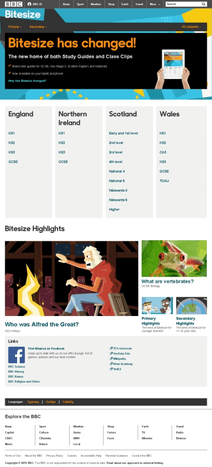Bitesize
Bitesize is the BBC's free online study support resource for school-age pupils in the United Kingdom. It is designed to aid pupils in both schoolwork and, for older pupils, exams.[1]
 A screenshot of the Bitesize homepage | |
Type of site | Free online study resource |
|---|---|
| Available in | English, Welsh and Gaelic |
| Owner | BBC |
| Created by | BBC |
| URL | https://www.bbc.co.uk/bitesize |
| Launched | 1998 |
| Current status | Active |
National sections
England
The Key Stage 1, 2 and 3 along with GCSE section covers a range of subjects. In Key Stage 1, 17 subjects are available, including Art and Design, Computing, Design and Technology, English, Geography, History, Maths, Music, Physical Education, PSHE, Citizenship, Religious Education, Science, and Modern Foreign Languages.[2] The Key Stage 2 site covers 23 subjects,[3] Key Stage 3 section contains 33 subjects,[4] and the GCSE section contains 49 subjects across several exam boards.[5]
Scotland
Until 2014, the Standard Grade section of the site had 12 subjects: Biology, History, Chemistry, Computing Studies, Maths, English, Modern Studies (a course exclusive to Scotland), French, Physical Education, Geography, and Physics.[6] The site was updated in 2014 to replace the Standard Grade section with National 4 and National 5 sections. Gaelic versions of these were also made available.
Until 2014, in the Higher section, Biology, English, Geography, Maths, Chemistry, History, Modern Studies, Physics and the Scotland-only subject Scottish Gaelic were available. The Higher section was also updated to the new Curriculum for Excellence qualification. Early and 1st level, 2nd level, 3rd level, and 4th level resources were added to bring the site in line with the Curriculum for Excellence.
Wales
The CS3 and TGAU sections are in Welsh. Links to the English language sections are included.[7][8]
Northern Ireland
In 2014, a Northern Ireland section was added to the site. It solely contains links to the English language KS1/KS2/KS3/GCSE sections.[9]
See also
- e-learning
- Study skills for exam preparation
References
- Williams, Peter John (October 2007). "Valid Knowledge: The Economy and the Academy". Higher Education. 54 (4): 511–23. doi:10.1007/s10734-007-9051-y. JSTOR 29735128.
- "KS1 Section". BBC. 1970-01-01. Retrieved 13 March 2019.
- "KS2 Section". BBC. 1970-01-01. Retrieved 13 March 2019.
- "KS3 Section". BBC. 1970-01-01. Retrieved 16 July 2015.
- "GCSE Section". BBC. 1970-01-01. Retrieved 13 March 2019.
- "Standard Grade Bitesize". Bbc.co.uk. 1970-01-01. Retrieved 2012-06-28.
- "CA3 Section". BBC. 1970-01-01. Retrieved 16 July 2015.
- "BBC Bitesize - TGAU". www.bbc.co.uk. Retrieved 2015-07-16.
- "BBC Bitesize - Home". www.bbc.co.uk. Retrieved 2015-07-16.